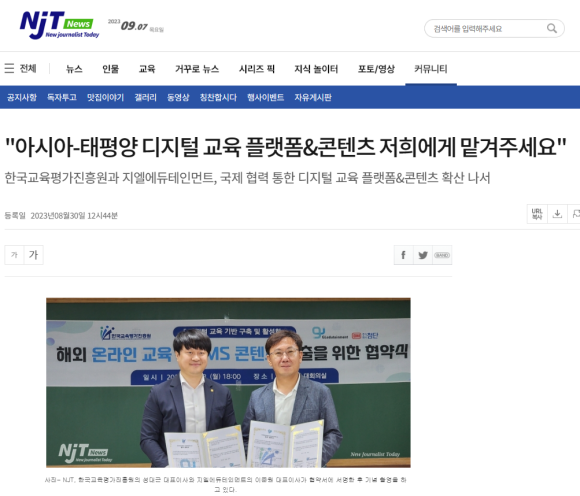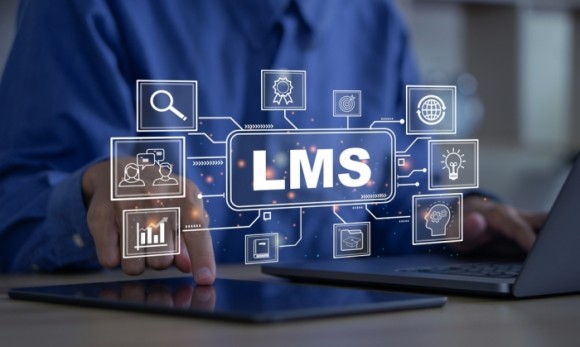"Please leave Asia-Pacific digital education platform & contents …
administrator
0
4021
2023.08.30 17:36
On the 28th, Korea Institute for Education & Evaluation Advancement and GL Edutainment (hereinafter referred to as "both institutions") recently signed an agreement to export and spread educational contents of the overseas learning management system (LMS).
The agreement is expected to serve as an opportunity to build the foundation for digital education, expand exports of overseas educational content, and foster internationally recognized practical talents.
The Role of KIEEA and GL EDT
Korea Institute for Education & Evaluation Advancement (CEO Seong Dae Geun) is an institution that conducts projects in various fields such as education business, R&D business, 4th industrial technology development and education, SW/IT development, qualification business, and publishing business. GL Edutainment (CEO Lee Joon Won) aims to produce online and offline Korean language education programs for multinational foreigners to quickly adapt to domestic industrial sites and society, develop a learning management system (LMS), and supply them at home and abroad.
Importance of LMS
LMS stands for "Learning Management System" and is an online platform that supports education-related activities such as designing, implementing, evaluating, and managing curricula through the Internet. LMS allows instructors and students to share learning materials, manage learning activities, and check learning progress and performance at each location. Therefore, LMS supports learners to learn anytime, anywhere, and allows them to systematically manage learners' learning progress, participation, and grades. This is an absolutely necessary system in Asia-Pacific countries where education is currently hot.
The contents of MOU
The two organizations held an agreement ceremony on the third floor of the high-tech building in Mapo-gu, Seoul on the 28th, and agreed to export e-learning and LMS contents, establish a systematic education system, and exchange technologies, knowledge and information related to new content and system development. In addition, the two organizations agreed to cooperate in providing technical support and maintenance related to the LMS system, transmitting and spreading online educational content to overseas residents, fostering practical talents and cultivating related knowledge to meet national needs and needs.
Future forecast
Through this agreement, the two organizations are expected to cooperate first on joint projects and cooperate to make the most of their capabilities and resources to benefit each other. After establishing a joint business plan, the final contract reflecting it will be decided by a written agreement between the two companies, the two organizations said. If the agreement is successfully implemented, it is expected to achieve three main goals: building a digital education foundation, expanding exports of overseas educational content, and fostering internationally recognized practical talents.
Asia Pacific LMS Market
According to Market Research Dotcom's Asia-Pacific Learning Management System Market Forecast 2021-2028, the Asia-Pacific LMS market is expected to post an average annual growth rate (CAGR) of 19.17% from 2021 to 2028. Market ResearchCom analyzed that growth in the region will be reinforced by key factors such as increased investment in learning technology, cultural importance in education, a surge in web-based learning modules and mobile e-learning platforms, and rapid application of learning management systems across organizations.
The data included an analysis of South Korea, Indonesia, Japan, Singapore, Thailand, Australia & New Zealand, India, China and the Asia-Pacific region, which has an advantage in the online education market because it continues to encourage technological innovation and participation. South Korea provides the world's fastest Internet speed, and Internet connectivity is available in almost all regions. And in recent years, it is also considered an advantage that more students choose online learning than entering existing education.
Southeast Asia has a tradition of emphasizing education, and has a high literacy rate, 12-year free education, and a government that invests significantly in industry, so it is highly interested in digital education, digital content, and LMS. However, the education system is not working properly, and the resources allocated to achieve desirable results are insufficient. Therefore, these factors are expected to promote LMS market growth in the Asia-Pacific region.
The agreement is expected to serve as an opportunity to build the foundation for digital education, expand exports of overseas educational content, and foster internationally recognized practical talents.
The Role of KIEEA and GL EDT
Korea Institute for Education & Evaluation Advancement (CEO Seong Dae Geun) is an institution that conducts projects in various fields such as education business, R&D business, 4th industrial technology development and education, SW/IT development, qualification business, and publishing business. GL Edutainment (CEO Lee Joon Won) aims to produce online and offline Korean language education programs for multinational foreigners to quickly adapt to domestic industrial sites and society, develop a learning management system (LMS), and supply them at home and abroad.
Importance of LMS
LMS stands for "Learning Management System" and is an online platform that supports education-related activities such as designing, implementing, evaluating, and managing curricula through the Internet. LMS allows instructors and students to share learning materials, manage learning activities, and check learning progress and performance at each location. Therefore, LMS supports learners to learn anytime, anywhere, and allows them to systematically manage learners' learning progress, participation, and grades. This is an absolutely necessary system in Asia-Pacific countries where education is currently hot.
The contents of MOU
The two organizations held an agreement ceremony on the third floor of the high-tech building in Mapo-gu, Seoul on the 28th, and agreed to export e-learning and LMS contents, establish a systematic education system, and exchange technologies, knowledge and information related to new content and system development. In addition, the two organizations agreed to cooperate in providing technical support and maintenance related to the LMS system, transmitting and spreading online educational content to overseas residents, fostering practical talents and cultivating related knowledge to meet national needs and needs.
Future forecast
Through this agreement, the two organizations are expected to cooperate first on joint projects and cooperate to make the most of their capabilities and resources to benefit each other. After establishing a joint business plan, the final contract reflecting it will be decided by a written agreement between the two companies, the two organizations said. If the agreement is successfully implemented, it is expected to achieve three main goals: building a digital education foundation, expanding exports of overseas educational content, and fostering internationally recognized practical talents.
Asia Pacific LMS Market
According to Market Research Dotcom's Asia-Pacific Learning Management System Market Forecast 2021-2028, the Asia-Pacific LMS market is expected to post an average annual growth rate (CAGR) of 19.17% from 2021 to 2028. Market ResearchCom analyzed that growth in the region will be reinforced by key factors such as increased investment in learning technology, cultural importance in education, a surge in web-based learning modules and mobile e-learning platforms, and rapid application of learning management systems across organizations.
The data included an analysis of South Korea, Indonesia, Japan, Singapore, Thailand, Australia & New Zealand, India, China and the Asia-Pacific region, which has an advantage in the online education market because it continues to encourage technological innovation and participation. South Korea provides the world's fastest Internet speed, and Internet connectivity is available in almost all regions. And in recent years, it is also considered an advantage that more students choose online learning than entering existing education.
Southeast Asia has a tradition of emphasizing education, and has a high literacy rate, 12-year free education, and a government that invests significantly in industry, so it is highly interested in digital education, digital content, and LMS. However, the education system is not working properly, and the resources allocated to achieve desirable results are insufficient. Therefore, these factors are expected to promote LMS market growth in the Asia-Pacific region.
-



